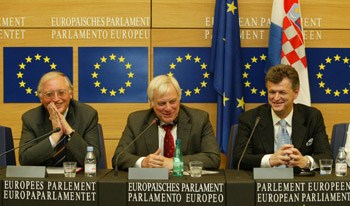At the invitation from the European Commission, today 20 April 2004, a Croatian delegation visited Strasbourg, led by Foreign Minister Miomir Žužul, along with Minister of European Integrations Kolinda Grabar-Kitarović, Assistant Foreign Minister Neven Madey, and Ambassador to the European Communities Mirjana Mladineo
After applying for membership 21 February 2003 in Athens, Croatia received last June a questionnaire with 4744 questions. The answers were submitted to the President of the European Commission Romano Prodi in October, and from then on, based on these answers and information gathered from other sources, the European Commission evaluated the reforms achieved in Croatia. The Opinion gives a detailed overview and assessment of the situation regarding the meeting of the political and economic criteria for membership, as well as Croatia’s ability to adopt and implement the Community’s acquis. It can be gathered from the Opinion that Croatia is seen as a country of stable democracy, with a functioning market economy, a country that has come a long way in implementing the Copenhagen criteria and political condition determined by the Stabilisation and Association Agreement.
Apart from the Opinion, the Commission proposed to the Council today the draft of the European partnership, in which it laid out the short and middle term measures that Croatia should take. The Croatian government will study these documents carefully and will adapt its annual National program for association with the European Union in accordance with the suggestions from the Opinion and the European partnership. The European Commission’s Opinion will be an important instrument for conducting further reforms, especially in those segments where certain problems and the need for a complete realisation of European standards have been identified.
By gaining the candidate status, aside from the CARDS program that is currently used in financing the reforms to meet the EU standards, Croatia will be able to use the means from the EU preaccession programs for stimulating the development of agriculture, traffic and environment protection.
The Croatian Ministry of Foreign Affairs and the Ministry of European Integration consider this recommendation to be of a far-reaching importance and allows Croatia to begin its approach to the EU, which is its primary strategic goal. It also gives credit to the Croatian government for its intensive political and diplomatic activity which ensured the full implementation of the political criteria and met the conditions for gaining the candidate status, and is the best way to encourage other countries in the region to begin with the reforms and the strengthening of the European perspective.
The Croatian government expects this recommendation to lead to the reaching of a political decision on starting the association negotiations, due on European Council’s agenda 17-18 June 2004.
Press releases


